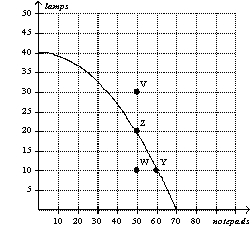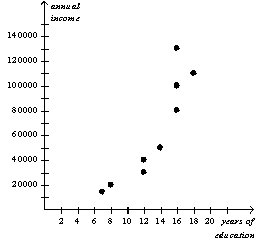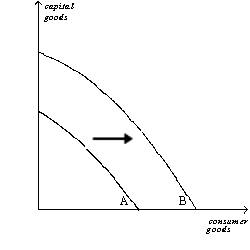A) is a normative statement.
B) is a positive statement.
C) would only be made by an economist speaking as a scientist.
D) would only be made by an economist employed by the government.
F) None of the above
Correct Answer

verified
Correct Answer
verified
True/False
In surveys of professional economists,fourteen propositions were endorsed by an overwhelming majority of respondents.
B) False
Correct Answer

verified
Correct Answer
verified
Multiple Choice
Figure 2-4
 -Refer to Figure 2-4.This economy cannot currently produce 30 notepads and 45 lamps because
-Refer to Figure 2-4.This economy cannot currently produce 30 notepads and 45 lamps because
A) some of its resources are unemployed.
B) inefficiencies exist in this economy's production process.
C) given its current technology, it does not have the resources to produce that level of output.
D) All of the above are correct.
F) B) and D)
Correct Answer

verified
Correct Answer
verified
True/False
Historical episodes are not valuable to economists.
B) False
Correct Answer

verified
Correct Answer
verified
True/False
In the ordered pair (10,30),10 is the y-coordinate and 30 is the z-coordinate.
B) False
Correct Answer

verified
Correct Answer
verified
Multiple Choice
Instead of conducting laboratory experiments to generate data to test their theories,economists often
A) ask winners of the Nobel Prize in Economics to evaluate their theories.
B) argue that data is impossible to collect in economics.
C) gather data from historical episodes of economic change.
D) assume that data would support their theories.
F) A) and C)
Correct Answer

verified
Correct Answer
verified
Multiple Choice
Economists who are primarily responsible for advising Congress on economic matters work in which agency?
A) the Federal Reserve
B) the Congressional Budget Office
C) the Department of the Treasury
D) the Department of Commerce
F) A) and C)
Correct Answer

verified
Correct Answer
verified
Multiple Choice
Figure 2-8
 -Refer to Figure 2-8,Panel (a) and Panel (b) .Which of the following is not a result of the shift of the economy's production possibilities frontier from Panel (a) to Panel (b) ?
-Refer to Figure 2-8,Panel (a) and Panel (b) .Which of the following is not a result of the shift of the economy's production possibilities frontier from Panel (a) to Panel (b) ?
A) the tradeoff between the production of donuts and coffee changes
B) the opportunity cost of a cup of coffee is higher at all levels of coffee production
C) production of 4 donuts and 2 cups of coffee becomes possible
D) production of 1 donut and 4 cups of coffee becomes efficient
F) A) and D)
Correct Answer

verified
Correct Answer
verified
Multiple Choice
Policies such as rent control and trade barriers persist
A) because economists are about evenly divided as to the merits of those policies.
B) because almost all economists agree that those policies have no discernible economic effects.
C) because almost all economists agree that those policies are desirable.
D) despite the fact that almost all economists agree that those policies are undesirable.
F) A) and B)
Correct Answer

verified
Correct Answer
verified
True/False
The effects of borrowing by the federal government would be studied by a microeconomist rather than a macroeconomist.
B) False
Correct Answer

verified
Correct Answer
verified
Multiple Choice
The scientific method is
A) the use of modern technology to understand the way the world works.
B) the use of controlled laboratory experiments to understand the way the world works.
C) the dispassionate development and testing of theories about how the world works.
D) the search for evidence to support preconceived theories about how the world works.
F) B) and C)
Correct Answer

verified
Correct Answer
verified
Multiple Choice
Figure 2-17
Relationship Between Years of Education and Annual Income
 -Refer to Figure 2-17.According to the graph,the correlation between years of education and annual income is
-Refer to Figure 2-17.According to the graph,the correlation between years of education and annual income is
A) positive
B) negative
C) inverse
D) normative
F) B) and D)
Correct Answer

verified
Correct Answer
verified
Multiple Choice
Figure 2-11
 -Refer to Figure 2-11.Which of the following would most likely have caused the production possibilities frontier to shift outward from A to B?
-Refer to Figure 2-11.Which of the following would most likely have caused the production possibilities frontier to shift outward from A to B?
A) a decrease in unemployment
B) a technological advance in the consumer goods industries
C) a general technological advance
D) an increase in the availability of capital-producing resources
F) A) and C)
Correct Answer

verified
Correct Answer
verified
Multiple Choice
The inner loop of the circular-flow diagram represents the flows of inputs and outputs.Which of the following does not appear on the inner loop?
A) Wages
B) Land
C) Capital
D) Goods and services sold
F) A) and C)
Correct Answer

verified
Correct Answer
verified
Multiple Choice
When economists make normative statements,they are
A) speaking as scientists.
B) speaking as policy advisers.
C) making claims about how the world is.
D) revealing that they are very liberal in their views of how the world works.
F) All of the above
Correct Answer

verified
Correct Answer
verified
True/False
If a major union goes on strike,then the country would be operating inside its production possibilities frontier.
B) False
Correct Answer

verified
Correct Answer
verified
True/False
Economic models are most often composed of diagrams and equations.
B) False
Correct Answer

verified
Correct Answer
verified
True/False
If new government regulations designed to protect wetlands remove very productive farmland from production,then the production possibilities frontier will shift inward.
B) False
Correct Answer

verified
Correct Answer
verified
Multiple Choice
When economists are trying to explain the world,they are
A) scientists.
B) policy advisers.
C) in the realm of microeconomics rather than macroeconomics.
D) in the realm of normative economics rather than positive economics.
F) B) and C)
Correct Answer

verified
Correct Answer
verified
Multiple Choice
Economists view normative statements as
A) prescriptive, making a claim about how the world ought to be.
B) descriptive, making a claim about how the world is.
C) statements about the normal condition of the world.
D) pessimistic, putting the worst possible interpretation on things.
F) B) and D)
Correct Answer

verified
Correct Answer
verified
Showing 501 - 520 of 535
Related Exams